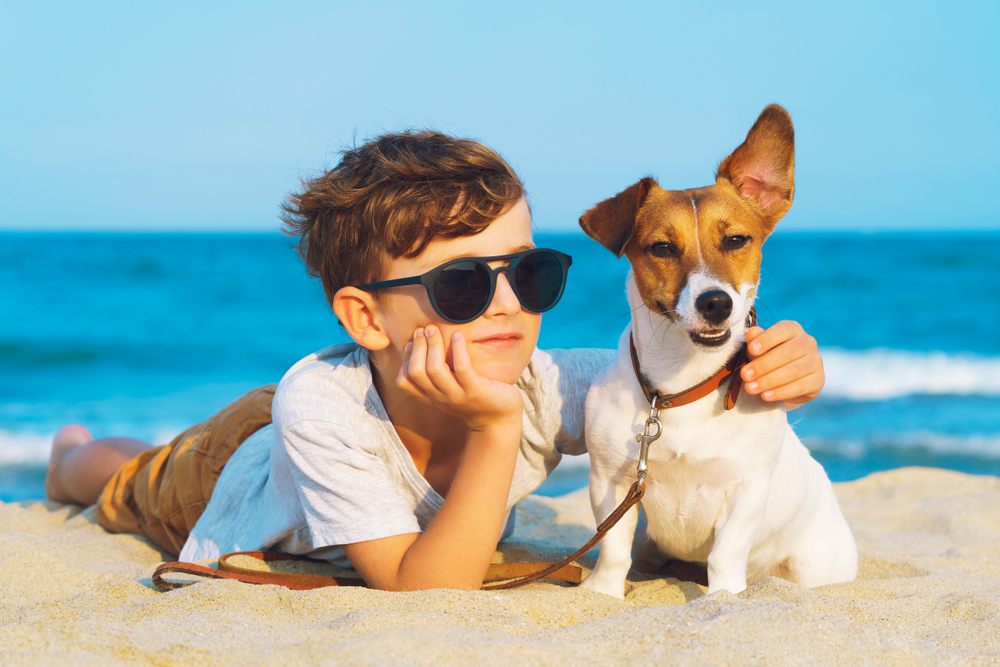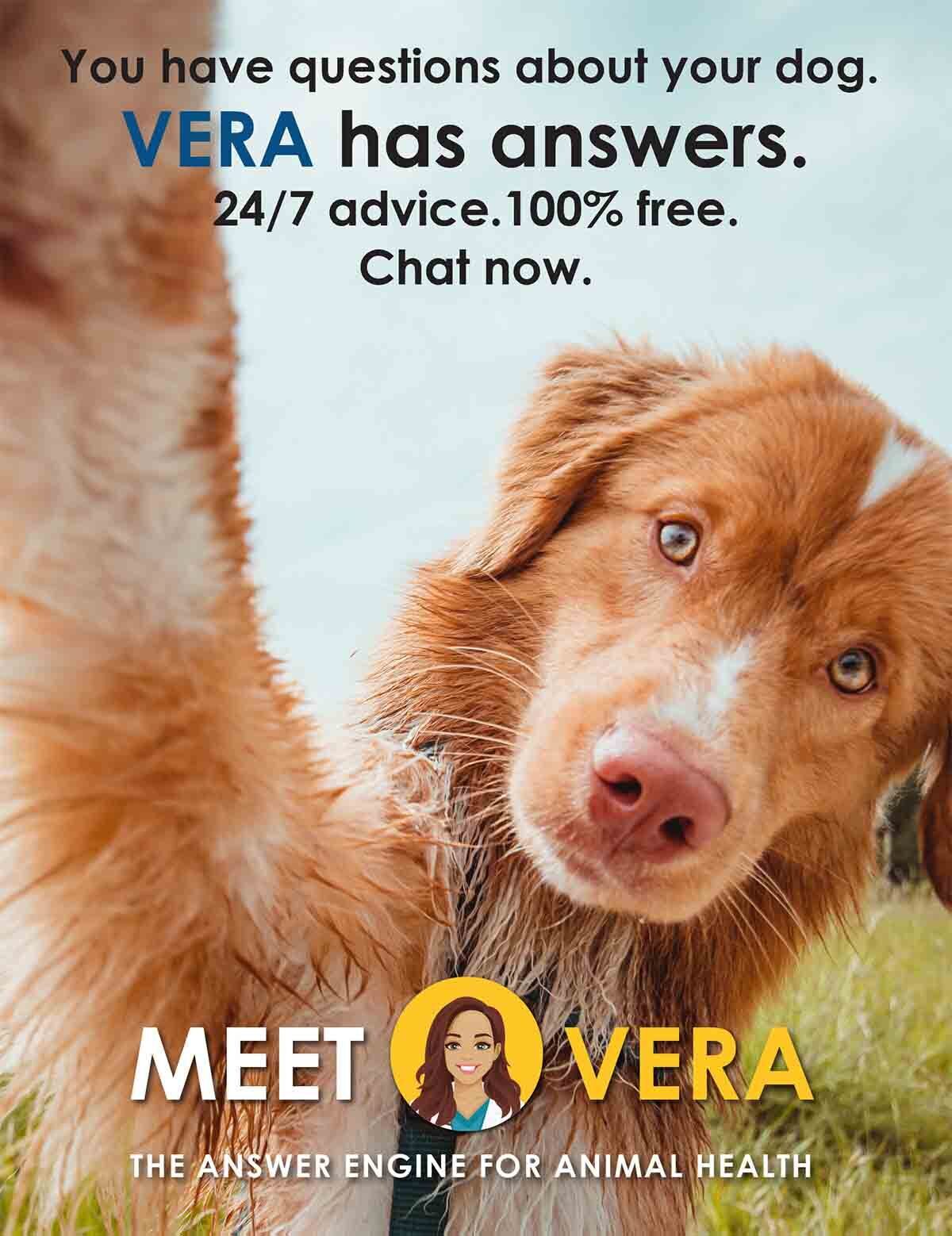For all animals, water quite literally is life! Although it creates quite a mess on the kitchen floor when your dog is slopping sips all over the place, seeing your pup visit the water bowl to quench their thirst appropriately is a satisfying sight.
However, worry can set in when you detect a decrease in your dog’s water consumption, and especially when your pup may be rapidly losing water through increased urination, vomiting, or diarrhea. Using this guide, you will learn the most common causes of dehydration in dogs, how to recognize it, and how to treat and prevent it before permanent damage occurs. It is important that dogs consume a specific volume of water daily in order to maintain fluid and electrolyte balances for healthy organ function.
Common Causes of Dehydration in Dogs
As dogs go through their day, water and electrolytes (sodium, chloride, potassium, etc) are used and consumed by the body during normal processes like panting and breathing, heat exchange, urinating, defecating, and regular organ functions. When a dog eats and drinks, those fluids and electrolytes are replenished. Proper fluid balance within a dog’s body is SO important that they have multiple ways of regulating all of the variables that affect hydration.
The brain, kidneys, and adrenal glands work together to regulate urine output, blood pressure, and volume to meet the needs of your dog’s entire body! If that very tightly regulated fluid and electrolyte balance is thrown off, animals can become dehydrated, taking a toll on organ function and putting the overall health of the animal in danger.
Humans and animals alike can become dehydrated in two simple ways: a decrease in water intake, or an increase in water loss from the body. Pretty basic and easy to avoid and identify, right? Actually, dehydration is very complicated and can happen fairly quickly and easily, right before your eyes.
Decreased Fluid Intake
Anything that will prevent your dog from drinking water to replenish natural fluid losses will cause them to become dehydrated – exercising and long hikes without being offered a water source, water bowls that go empty for long periods of time, a dirty and unappealing water supply, and inability to access water for a variety of other reasons can all cause dehydration.
Dogs should be offered access to clean water 24/7. When out for hikes and walks, bring a nice folding water bowl and a bottle with enough water for humans and pups to share several times every hour during the outing!
Even if there is plenty of clean water available, sometimes dogs will just not want to drink. This can happen any time a dog is feeling sick, especially if they are nauseous or have gastrointestinal pain. Ill or injured animals and animals that have recently had surgery often do not feel like getting up and eating or drinking. Since dogs also ingest water with their food, a lack of appetite and decreased food intake can also contribute to canine dehydration. To make matters worse, sick and injured animals often require MORE fluids than when they are feeling healthy––so becoming dehydrated occurs more quickly and makes them even LESS likely to want to eat and drink to help themselves. As you can see, a vicious cycle can occur when there is fluid and electrolyte depletion without replenishment.
Increased Fluid Loss
If you think about all of the ways that water can exit the body, the most common abnormal sources of fluid loss are persistent vomiting and diarrhea. In these situations, water and electrolytes are rapidly leaving the dog’s body, and likely will not be replenished without medical intervention. Other common causes of increased fluid loss can occur with anything causing the kidneys to be unable to fulfill their normal function of concentrating urine and conserving water – kidney failure, diabetes mellitus, toxin exposure, diabetes insipidus, Addison’s disease, and tumors/cancer, to name a few. Other causes of excessive fluid loss include fevers, excessive panting from increased body temperature or heat stroke in dogs, and lactation for female dogs nursing puppies.
Signs of Dehydration in Dogs
If you think your dog may be experiencing dehydration, here are some physical signs to look for at home. If your pet needs to be examined by your local veterinarian, these same physical signs will be assessed and considered along with the results from a Complete Blood Panel and Chemistry Panel (blood tests), as well as a Urinalysis (urine test). Each of these tests gives more clues as to the original cause of the dehydration, how aggressively treatment should be pursued, the current extent of your dog’s illness, and prognosis for long-term management and recovery.
Outward Physical Signs and Symptoms of Dehydration in Dogs
- Pale gums
- Panting
- Dry nose and mouth, lack of saliva
- “Tacky” (sticky and dry) mucus membranes
- Sunken-appearing eyeballs
- Weight loss
- Acting lethargic and weak, loss of balance
- Fast heart rate, weak pulses
- Decreased “Capillary Refill Time” – press on the gums and blanch the color. Upon release of your finger, the pink color should return in 3 seconds or less in a hydrated dog.
- Prolonged “Skin Tent” – gently pinch and pull up on the skin between the shoulder blades and release it. If hydrated, the dog’s skin should fall back into place quickly, but it will stay tented or slowly return in a dehydrated dog.
How to Treat Dehydration in Dogs
If you suspect your pup may be dehydrated, check those water bowls first and make sure that the symptoms you are seeing are not due to something simple, like lack of access to drinking water. If your dog is panting but otherwise acting normally, offering a clean water source is appropriate and monitoring their consumption and urine frequency is important as well. We do not want a dog experiencing excessive thirst to engorge themselves with water too quickly, as this can cause vomiting or may be related to Gastric Dilatation and Volvulus (GDV or “bloat”) in large breed deep-chested dogs.
If vomiting, diarrhea, changes in urinary habits, lethargy, low energy, or decreased appetite are observed in a dog, a visit to the veterinarian is vital. The physical exam, blood, and urine testing, and any additional tests recommended by the veterinarian to further explore the issue will determine the original cause of the illness, and dictate the appropriate treatment for any medical condition identified. A hospital stay may be warranted with correction of the dehydration using intravenous (IV) fluids and electrolyte supplementation to expand the blood volume and ensure that the vital organ function is maintained before any irreversible damage occurs. Some diet changes and supportive care may be appropriate too, depending on the situation. Treatment of the underlying cause, if there is one, of the dehydration will also be addressed if needed.
Many pet parents ask about giving Pedialyte to dogs who are vomiting or are possibly dehydrated. Veterinarians do not usually recommend giving Pedialyte to dogs for the reasons that it can make vomiting worse, can have serious issues if diabetes is the root cause (due to the sugar content), and the product was developed and balanced based on humans and not dogs. Veterinarians DO recommend a clean and cool source of water offered or combined with meals in order to increase the water consumption. Any dog that is showing signs of dehydration should be evaluated by a veterinarian immediately.
How to Prevent Dehydration in Dogs
If dehydration originated from a lack of access to water, the fix is easy … take water breaks on hikes, exercise during cooler parts of the day and at the appropriate fitness level for all involved, provide 24/7 access to clean water in an accessible area, and experiment with different types of water bowls and locations around the house to zero in on your dog’s drinking preferences. If you suspect that your dog may be drinking less, monitor their daily intake over 24 hours, and then discuss your findings with your veterinarian.
If the dehydration is due to an illness, diagnosis and management of that health condition and monitoring changes in your dog’s water intake and urine output will help prevent issues with dehydration in the future. Any future changes in drinking and urine habits for dogs with illnesses is crucial information that you should share with your veterinarian as it is noted.
Putting It All Together
Maintaining their hydration level is one of the most important jobs for a dog every day, and they may not even realize it! Not drinking enough or losing water due to illnesses or medical conditions can create serious internal issues for your dog. If dehydration is suspected, your dog should be evaluated immediately by your veterinarian so that any fluid and electrolyte deficits can be rebalanced, and underlying conditions can be treated to get your pup back on track and feeling their best!
Our AskVet Veterinarians are available via our vet app to discuss all of your pet’s needs 24 hours a day, 7 days a week. Whether you have an immediate need or are looking to improve your pet’s overall wellbeing, or looking to learn about proper dog heat stroke treatment and how much water should a dog drink just sign into your account and one of our friendly and knowledgeable veterinary experts will attend to your needs, no appointment required!
Written by:
Alexa Waltz, DVM
Dr. Waltz was raised near the beaches of Southern California but has spent her adult life living all over the beautiful United States while serving in the military and as a military spouse. She left California for the first time to pursue a career as a veterinarian at Louisiana State University School of Veterinary Medicine and graduated as a Doctor of Veterinary Medicine in 2006. She was accepted into the US Army Health Professionals Scholarship Program during vet school and upon graduation spent her military years as a veterinarian in San Diego working for the US Marine Corps and US Navy Military Working Dog programs as well as caring for pets of service members. After her military service, she became a civilian veterinarian and continued as a small animal general practitioner at clinics in California, Rhode Island, Colorado, and Maryland. Dr Waltz loves to see her “in person” patients just as much as communicating with and assisting pet parents virtually on AskVet. Dr Waltz is also a Mom to 3 humans, 2 guinea pigs, and 1 Australian Shepherd and in her spare time she loves traveling, adventures, exercising, and doing just about anything out in nature!






